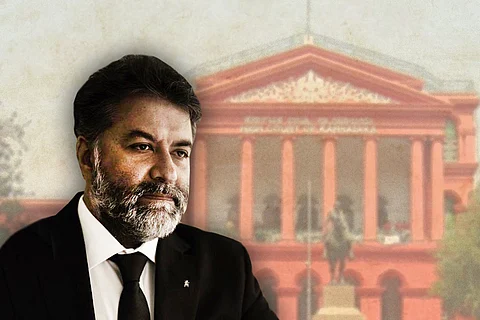

It is obvious that mine was a case where the government was averse to my appointment, says Bengaluru-based senior advocate Aditya Sondhi, who last month withdrew his consent for his elevation as a Karnataka High Court judge. Sondhi was in February 2021 recommended by the Supreme Court Collegium for elevation as a judge of the Karnataka High Court. However, after a year’s impasse, on February 4, 2022, Aditya Sondhi decided that “one year was more than a reasonable time to have waited.”
In a resolution published in February 2021, three names were announced by the Collegium to be elevated as judges of the Karnataka High Court — Sondhi and two other judicial officers, Rajendra Badamikar and Khazi Jayabunnisa Mohiuddin. While the two others are currently additional judges in the High Court, Sondhi’s recommendation has not seen any progress. Sondhi has been a senior advocate in the High Court since June 2014 and has served as the Additional Advocate General for the Karnataka government, when he was appointed to the post in 2016. A graduate of the National Law School of India University (NLSIU) in Bengaluru, Sondhi enrolled at the bar in 1998. He completed his Master’s in the subject from Bangalore University and has a PhD in Political Science from Mysore University.
Sondhi shares he was 34 years old when he was first informally asked if he was interested in becoming a judge. However, he was under-age, as per the practice of only being considered when one is about 45 years of age. But when his name did get recommended by the Collegium for elevation, there was no progress.
“I certainly did not expect a delay of one year when my name was recommended, considering the Collegium recommendation is made after the Executive has had its say. But when two others (district judges) from my list were appointed to the High Court in March 2021, I realised my name had been segregated and that it could well be a long haul from thereon. When my file was returned to the Supreme Court in August 2021 and my name was promptly reiterated by the Collegium, I did think the appointment should then come through fairly quickly. But when the Executive chose to make fresh appointments to the High Court in November 2021, it became clear that the delay would continue indefinitely,” Sondhi tells TNM.
Sondhi has no way of verifying the reason for the inordinate delay in his appointment. Neither the Union government, nor the Collegium system substantiates its decisions and recommendations with reasons. For this, the process of appointment of judges in India has often been criticised for not being transparent. Sondhi tells TNM that he has not received an official reply to his letter to the Collegium after he withdrew his consent.
“It was when I was overlooked in November 2021, that I firmly decided to withdraw my consent. It was driven by my sense of self-respect as also a need to stand up for the Bar, which deserves to be treated fairly. Several well-wishers advised me to wait a while, as they felt the reiteration by the Supreme Court Collegium was binding on the Executive, as is the case in law and tradition. However, as the weeks went by, it was apparent that I was going to be kept in limbo. Having given my consent with the intent of serving the judicial system, there was no point in standing by when the opportunity to serve was not forthcoming. As such, I decided that one year was more than a reasonable time to have waited and accordingly withdrew my consent on February 4, 2022,” Sondhi tells TNM.
The appointments, elevation of judges and lawyers to the Supreme Court and transfers of judges of High Courts and apex court are approved by the Supreme Court Collegium, a forum comprising the Chief Justice of India and the four senior-most judges of the Supreme Court.
As per the procedure for the appointment of judges to the Supreme Court and the 25 high courts, the apex court Collegium recommends the names of candidates to the Union government which, in turn, either accepts the proposal or returns it for reconsideration. The High Court collegiums first send their recommendations to the Law Ministry which, in turn, processes the files by attaching IB reports and forwards it to the SC collegium.
Now, delays in judicial appointments in India are not new. But this was certainly not a case of ‘usual’ systemic delays, says Aditya Sondhi. “We know of cases where appointments are cleared in a matter of weeks. It is obvious that mine was a case where the Government was averse to my appointment and the deadlock could practically only be broken by my withdrawal. Someone in my position cannot control the outcome of the situation, but can only control their own decision to withdraw.”
“There are at least a dozen individuals whose appointments are pending even after being reiterated by the Supreme Court Collegium, and three cases that are pending even after a second reiteration, which is unprecedented. I learnt of a contempt petition filed by the Advocates’ Association, Bengaluru before the Supreme Court of India in November 2021, alleging disobedience of binding judicial directions of the Supreme Court in PLR Projects Vs Mahanadi Coalfields Ltd and Others (order dated 20 April, 2021), in the matter of appointment of High Court judges pan-India. However, to the best of my knowledge, the petition has not yet been listed for admission.”
The Supreme Court, in the PLR projects case, had said that the appointments of judges should be done immediately after recommendation, and within three-four weeks upon the reiteration of the recommendations. Citing this, the contempt plea filed in the Supreme Court in 2021 sought contempt proceedings against the Union government for not clearing 11 names that were recommended and reiterated for elevation as high court judges.
Currently, the Karnataka High Court has 17 vacancies, with 45 working judges against a sanctioned strength of 62 judges.